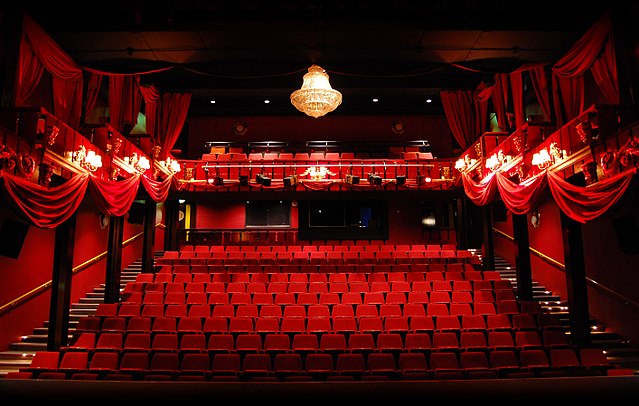Difference Between Theatre and Theater
The two terms ‘theatre’ and ‘Theater’ may appear to be similar to the common English speaker, but there are striking differences that distinguish the two words.
Both refer to a building, room mostly centered with a stage or stages where performers of all sorts from dancers, to artists to magicians display their skills.
The two words can also be used to refer to the profession of acting, performing plays or directing.

What is Theatre?
The word theatre is mostly used in British English today. This term originated from the city of Athens, as a result of an eruption of a performance culture. This was back in (384 – 322 BCE) when festivals, rituals, music and poetry had become popular in Greece, with artists showcasing their prowess on stages referred to as theatres. This dating is based on Aristotle’s records. The participation in such performances back in the day in Greece, was compulsory for all residents. Everyone came together to applaud, criticize and appreciate the different array of performers. The theatres back then, could host between ten thousand to twenty thousand people.
There were three different categories to the performances displayed; satyr, comedy and tragedy. There were strict regulations for the performers to only be male. Women were not considered entertaining enough to be set up on a stage. Today the term theatre, refers to a building or room with a stage or stages where different performers would come together to entertain the audience. The term is mostly used in Britain, and is often pronounced with a British accent; thee-ə-ter.

What is Theater?
Theater just like theatre refers to an area set aside for different performances, it could be a whole building with different stages or one big room with a single stage. The term theater was first used in France in the 14th century. The name later spread on to Spain where it acquired a different spelling, ‘theaturm’. The origin of the term was a mix of the suffix, ‘thea’ which means view and ‘tron’ that means a place. Meaning ‘ a place to see’. It is only in the 1570’s that the term was used in an English context. American retained the spelling of theater the -er. This was adopted in America approximately 50 years ago and is still facing great opposition in fully adoption.
Similarities between Theatre and Theater
Pronunciation
Both theatre and theater have the same pronunciation. They are pronounced as thee-ə-ter.
Meaning
Theatre and theater refer to one and the same thing. They are used to refer to a place, building or room with a stage where different performers such as dancers, musicians, comedians and actors showcase their prowess.
Differences Between Theatre and Theater
Spelling
The spelling differences include t-h-e-a-t-r-e and t-h-e-a-t-e-r.
Origin
The term theatre is believed to originate from Greece. The term theater is believed to originate from France.
Region of Use
Theatre is often used in Britain and is related to British publications. Theatre is often used in America and is related to American publications. It is however still not fully adopted in America, as some believe the rightful term is theatre.
Age
The term theatre is older that theater. Theatre has been in use from the 300 BC while theater only emerged in the 14th century. Theater was also only adopted in America 50 years ago they formerly used theatre.
Theatre vs. Theater

Summary of Theatre vs. Theater
- The terms theatre and theater are used to refer to a place where people meet to watch different performances from artists, musicians, poets, dancers, comedians and actors.
- Both theatre and theater have the same pronunciation, however teh accents may differ due to the area of use.
- Theatre is much older in use compared to theatre.
- Theatre is used mostly in Britain while theater is used in America.
- Theatre is believed to have originated in Greece within 300 BC, while theatre is believed to have originated from France in the 14th century.
- Both terms have similar pronunciations thee-ə-ter, the major difference arises in the spelling.
- Difference Between S Corp and C Corp - September 9, 2018
- Difference Between Terrace and Balcony - September 9, 2018
- Difference Between Anabaptists and Evangelicals - August 31, 2018
Search DifferenceBetween.net :
2 Comments
Leave a Response
References :
[0]Delgado, M. M. (2003). “Other” Spanish Theatres: Erasure and Inscription on the Twentieth Century Spanish Stage. Manchester University Press.
[1]Machon, J. (2013). Immersive Theatres: Intimacy and Immediacy in Contemporary Performance. Macmillan International Higher Education.
[2]Barnett, D. (1998). Literature versus theatre: textual problems and theatrical realization in the later plays of Heiner Müller. P. Lang.
[3]Image credit: https://upload.wikimedia.org/wikipedia/commons/thumb/8/89/The_Main_House_Theatre%2C_The_Maltings_Theatre_%26_Arts_Centre%2C_Berwick-upon-Tweed%2C_March_2009.jpg/640px-The_Main_House_Theatre%2C_The_Maltings_Theatre_%26_Arts_Centre%2C_Berwick-upon-Tweed%2C_March_2009.jpg
[4]Image credit: https://upload.wikimedia.org/wikipedia/commons/thumb/b/b8/Ekhof-Theater_Zuschauerraum.JPG/640px-Ekhof-Theater_Zuschauerraum.JPG

I think you have a little mistake, no offense.
Theatre is much older in use compared to theatre
Read more: Difference Between Theatre and Theater | Difference Between http://www.differencebetween.net/language/difference-between-theatre-and-theatre/#ixzz5VXoVe8lN
Well in that case, why can’t we use Theatre to refer a place or Bldg where people gather to watch a performance and Theater to refer as the art performed. Ex: I am studying Theater as a posed to I am going to the Theatre.